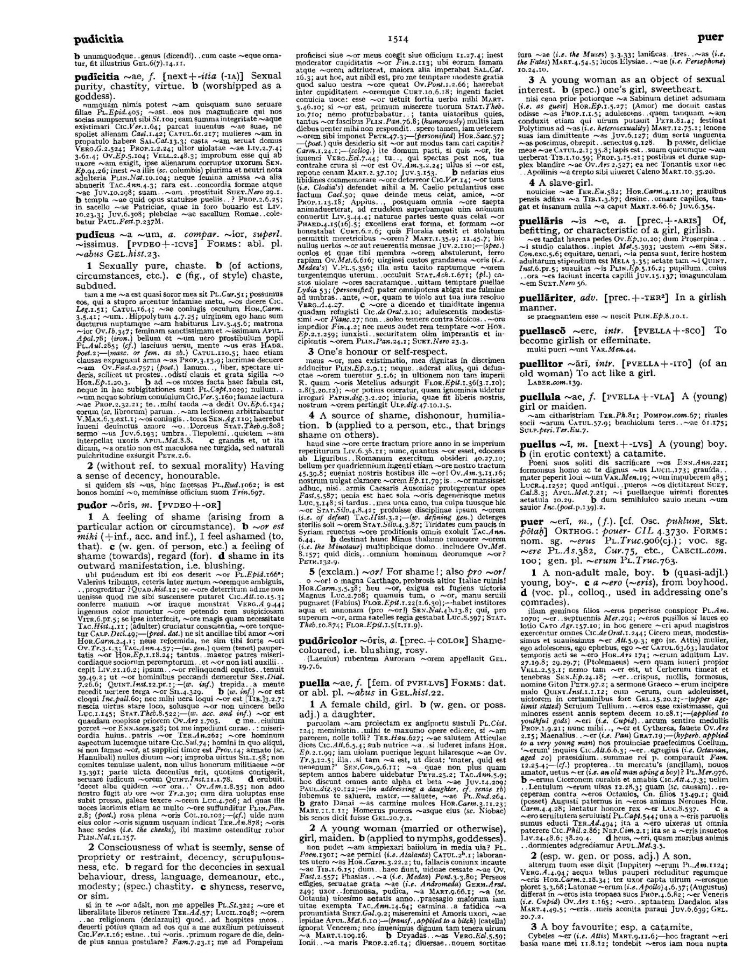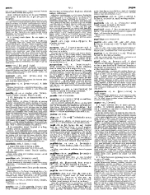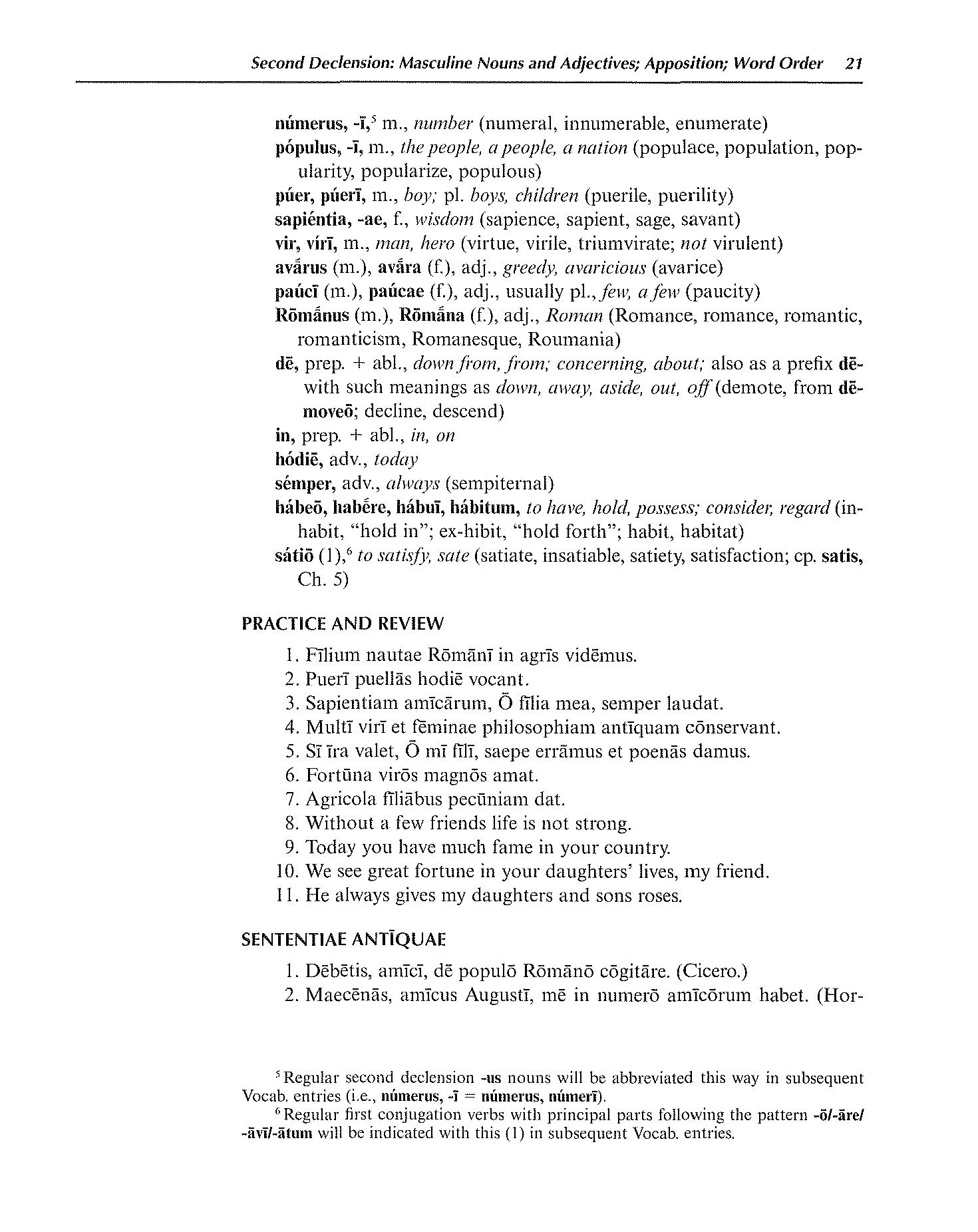
page_listing.tpl
page_subListingDetails.tpl
sub_listingDetails_style1.tpl
sub_listingDetails.title.tpl
puer boy
puer is a Latin Noun that primarily means boy.
Definitions for puer
Wheelock's Latin
Noun
- 1
boy
- 2
pl. boys, children
English derivatives:
puerile puerility
Oxford Latin Dictionary
Noun
- 1
A non-adult male, boy.
- 2
(esp. w. gen. or poss. adj.) A son.
- 3
A boy favourite; esp. a catamite.
Sentences with puer
Latin to English
Puer et puella sunt bonī.Compare The boy and girl are good.
Puer cuius patrem iuvābāmus est fortis.Compare The boy whose father we used to help is brave.
Magister multōs puerōs docet.Compare The teacher teaches many boys.
Magister haec alterī puerō dat.Compare The teacher gives these things to the other boy.
Ignem ex manibus puerī ēripuimus.Compare We snatched the fire from the hands of the boy.
Mutavit mentem populus levis et calet uno scribendi studio; pueri patresque severi fronde comas vincti cenant.Compare The fickle populace has changed its taste, and nowadays is fevered with a universal passion for writing. Boys and grave fathers alike sit at supper with their brows crowned with leaves.
Ibi casus rex sum Ptolemaeus, puer aetam magnus copiae cum soror Cleopatra bellum gerens.Compare There by chance was king Ptolemy, a boy in age, carrying on war with a large force against his sister Cleopatra.
Hostis si quis erit nobis, amet ille puellas: gaudeat in puero, si quis amicus erit.Compare May my enemies love women, may my friends delight in boys.
Declension table for puer
Cactus2000
| Singular | Plural | |
| Nom. | puer | puerī |
| Gen. | puerī | puerōrum |
| Dat. | puerō | puerīs |
| Acc. | puerum | puerōs |
| Abl. | puerō | puerīs |
Data sources
Notes
- Definitions
- Frederick M. Wheelock, Wheelock's Latin, 6th ed., rev. Richard A. LaFleur (New York, NY: HarperCollins Publishers, 2005): 21.
- P. G. W. Glare, Oxford Latin Dictionary, Vols. 1-8 (Oxford: Clarendon Press, 1982): 1514.
- Word frequencies
- Christopher Francese, "Latin Core Vocabulary," Dickinson College Commentaries, last modified 2014, http://dcc.dickinson.edu.
- Paul B. Diederich, The Frequency of Latin Words and Their Endings, PhD diss., (Columbia University, 1939).
- Louis Delatte, Suzanne Govaerts, Joseph Denooz, and Etienne Evrard, Dictionnaire fréquentiel et index inverse de la langue latine [Frequency Dictionary and Inverse Index of the Latin Language] (Liège, Belgium: Laboratoire d'analyse statistique des langues anciennes de l'Université de Liège [L.A.S.L.A.], 1981): 121.
Bibliography
Allen, Joseph H. Allen and Greenough's New Latin Grammar for Schools and Colleges: Founded on Comparative Grammar. Edited by James B. Greenough, George L. Kittredge, Albert A. Howard, and Benjamin L. D'Ooge. Boston, MA: Ginn & Company, 1903.
Crystal, David. A Dictionary of Linguistics and Phonetics. 6th ed. Oxford, UK: Blackwell Publishing, 2008.
Delatte, Louis, Suzanne Govaerts, Joseph Denooz, and Etienne Evrard. Dictionnaire fréquentiel et index inverse de la langue latine [Frequency Dictionary and Inverse Index of the Latin Language]. Liège, Belgium: Laboratoire d'analyse statistique des langues anciennes de l'Université de Liège (L.A.S.L.A.), 1981.
Diederich, Paul B. The Frequency of Latin Words and Their Endings. PhD diss., Columbia University, 1939.
Francese, Christopher. "Latin Core Vocabulary." Dickinson College Commentaries. Last modified 2014. http://dcc.dickinson.edu/latin-vocabulary-list.
Gildersleeve, Basil L., and Gonzales Lodge. Gildersleeve's Latin Grammar: Third Edition, Revised, and Enlarged. 3rd ed. London, England: Macmillan and Co., 1903.
Glare, Peter G.W. Oxford Latin Dictionary. Vols. 1-8. Oxford, England: Clarendon Press, 1982.
Krüger, Bernd. "Latin Conjugation Tables." Cactus2000. Accessed May 5, 2023. https://latin.cactus2000.de/index.en.php.
Pierson, Nick. "Sound of Text." Accessed October 26, 2019. https://soundoftext.com.
Wheelock, Frederick M. Wheelock's Latin. 6th ed. Revised by Richard A. LaFleur. New York, NY: HarperCollins Publishers, 2005.
Wiktionary Contributors. "Victionarium." Wikimedia Foundation, Inc. Updated March 18, 2019. https://la.wiktionary.org/wiki/Victionarium:Pagina_prima.
Citation
Chicago (17th ed.)
Allo Contributors. "puer, puerī (n.) - Latin Word Definition." Allo Latin Dictionary. Last modified . Accessed February 20, 2026. http://ancientlanguages.org/latin/dictionary/puer-pueri.
Entry created on . Last updated on .








